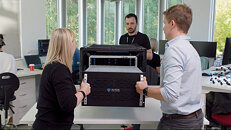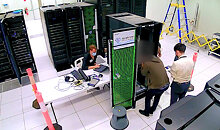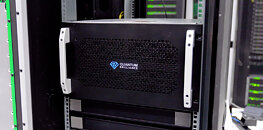- Joined
- Aug 19, 2017
- Messages
- 2,582 (0.97/day)
Quantum computing is an upcoming acceleration aiding classical computational methods to achieve monumental speed-ups at a few select problems. Unlike classical computers, quantum systems usually require sub-ambient cooling to make them work. At Quantum Brilliance, an Australian-Germany startup company, researchers have been developing quantum accelerators based on diamonds. Today, we got the world's first installation of room-temperature on-premises quantum computers at Australia's Pawsey Supercomputing Centre. While we don't have much information about the computational capability of the system, we know that it is paired with HPE Setonix, Pawsey's HPE Cray EX supercomputer.
In a brief YouTube video shared by Pawsey, it is highlighted that the benefits of using quantum accelerators are real, and they are figuring out ways to integrate it with the center's hardware and software stack for better usage. Meanwhile, Quantum Brilliance diamond accelerators are still a black box of some sort as the technology is known to the startup and its collaborating Australian universities. All we know is that the company is harnessing nitrogen-vacancy (NV) center in diamonds, which supposedly have the longest coherence time of any room temperature quantum state. This translates to a qubit that can operate anywhere a classical computer can.



View at TechPowerUp Main Site | Source
In a brief YouTube video shared by Pawsey, it is highlighted that the benefits of using quantum accelerators are real, and they are figuring out ways to integrate it with the center's hardware and software stack for better usage. Meanwhile, Quantum Brilliance diamond accelerators are still a black box of some sort as the technology is known to the startup and its collaborating Australian universities. All we know is that the company is harnessing nitrogen-vacancy (NV) center in diamonds, which supposedly have the longest coherence time of any room temperature quantum state. This translates to a qubit that can operate anywhere a classical computer can.



View at TechPowerUp Main Site | Source








